By Dashnor Kaloçi
Part Fourteen
Memorie.al / From the end of November 1944, when he officially came to power, until his death in 1985, the communist dictator Enver Hoxha, wanting to emulate his idol, Iosif Vissarionovich Stalin, and following his “path,” would occasionally carry out purges in the high leadership of the PPSH (Albanian Party of Labour). He had practically started this from 1941, with Anastas Lula and Sadik Premte, continued with Koçi Xoxe (and his group) in 1948-’49, and ended in 1981-’82, with the so-called “hostile group of Mehmet Shehu and Kadri Hazbiu.” In this time interval of more than four decades, as is already known, he eliminated almost all the founders of the Albanian Communist Party, the members of the Political Bureau of the Central Committee of the PPSH, and the main leaders of the so-called “National Liberation Anti-Fascist War.” As a result, from 1960 until the collapse of the communist regime in 1990, only Pilo Peristeri had escaped prison or internment, enjoying privileges as a perpetual candidate of the Political Bureau and the function of director of the “Enver Hoxha” Autotractor Combine!
However, unlike what he had done until the early ’70s, where Enver Hoxha’s “sword” had fallen mainly on the high leadership of the PKSH (Albanian Communist Party), (Koçi Xoxe, Kristo Themelko, Sotir Vullkani, Ramadan Çitaku, Tuk Jakova, Bedri Spahiu, Liri Gega, Gjin Marku, Koço Tashko, Liri Belishova, etc.), whom he had accused of “deviating from the Party line” and had condemned as “traitors and enemies of the people,” in the mid-’70s, the dictator Enver Hoxha began to strike against some members of the Political Bureau who also held ministerial posts, such as Abdyl Këllezi and Koço Theodhosi, accusing them also as “saboteurs of the Socialist Economy”!
And just as he had done with Beqir Balluku, Petrit Duma, and Hito Çako (who were sentenced to death and executed), where, to prove their “hostile activity,” Enver Hoxha also sentenced a large group of senior officers to prison and internment. Similarly, with the so-called “Economic Sabotage Group,” which, in addition to Këllezi and Theodhosi, also included the two ministers Kiço Ngjela and Vasil Kati, some senior officials of the Trade sector were accused and sentenced, including well-known directors and specialists such as Andrea Manço, Ahmet Jegeni, Bardhyl Frashëri, etc., as well as those from the Oil sector, such as well-known leaders, engineers, and specialists like Filip Nashi, Beqir Alija, Koço Plaku, Milto Gjikopulli, Protoko Murati, Dhimitër Stefa, Jani Konomi, Nuredin Skrapari, etc.
As we will see in the documents in question, the investigative process against the so-called “Hostile and Sabotage Group of the Economy,” which the Ministry of Internal Affairs and the State Security had carried out with fabricated accusations and false testimonies or those obtained under torture, etc., was also continued by the Supreme Court of the People’s Republic of Albania, headed by Aranit Çela, “channeling” the accusations from a “legal” standpoint to “prove” what Enver Hoxha had said in the Plenums of the Central Committee of the PPSH against Abdyl Këllezi, Koço Theodhosi, Kiço Ngjela, Vasil Kati, etc.
Much has been said and written about all these individuals since the ’90s, by members of those “groups,” their family members, etc. Memorie.al has secured the archival documents of the Supreme Court of the People’s Republic of Albania of that time and the former Presidium of the People’s Assembly, where the “Hostile Group of the Economy,” “Trade,” and “Oil” were reviewed. These documents are seeing the light of publication for the first time, and we are publishing them in several issues, along with the corresponding photos and facsimiles.
In the first and second parts of this series of articles, we published documents about the former director of Makinaimport, Andrea Manço, originally from the village of Boboshtica in Korça, whose brother, Todo Manço, had served for years as chief engineer and director of the Bulqiza chromium mine, and also as a member of the People’s Assembly for several legislatures. When he passed away on November 6, 1974, a grand funeral ceremony was held for him, with tributes in the center of Tirana, where in addition to Enver Hoxha, the entire high leadership of the PPSH, led by Prime Minister Mehmet Shehu, participated. While Todo Manço (“Hero of Socialist Labour”) received all these honors, his brother, Andrea, almost two years later, would be tortured in the cells of the State Security and sentenced to death by firing squad as an “enemy of the people” and “agent of foreign agencies,” and his grave has still not been found! In this article, we are publishing the documents about the so-called “Hostile Group in the oil sector,” led by well-known cadres and engineers, Filip Nashi, Beqir Alija, Koço Plaku, Dhimitër Stefa, Protoko Murati, Milto Gjikopulli, Nuredin Skrapari, Jani Konomi, etc., as well as the minutes of the meeting of the Presidium of the People’s Assembly of the People’s Republic of Albania, where the request of those sentenced to death, Koço Plaku, Andrea Manço, and Milto Gjikopulli, to have their lives spared was reviewed.
Continued from the previous issue
MINUTES OF THE MEETING OF THE PRESIDIUM OF THE PEOPLE’S ASSEMBLY, WHERE THE REQUEST FOR THE SPARING OF THE LIVES OF THE THREE CONVICTS SENTENCED TO DEATH, ANDREA MANÇO, MILTO GJIKOPULLI, AND KOÇO PLAKU, WAS ALSO REVIEWED
MINUTES
Held at the Meeting of the Presidium of the People’s Assembly, dated June 26, 1976, Saturday, 9:00 AM.
The following comrades participated in the meeting: Haxhi Lleshi (Chairman), Rita Marko, Shefqet Peçi (Deputy Chairmen), Telo Mezini (Secretary), Jovan Bardhi, Muharrem Sefa, Naunka Bozo, Nuredin Hoxha, Pilo Peristeri, Rrapo Dervishi, Spiro Moisiu, Zina Franja (Members).
The meeting was held with the following agenda:
- Information on the implementation of the orders of the Presidium of the People’s Assembly to prevent workplace disputes.
- Proposals for decorations.
- Proposals for granting Albanian citizenship.
- Proposals for pardons.
- Proposal of the Council of Ministers on the appointment of ambassadors.
Item four on the agenda is taken into consideration.
Proposals for pardons.
COMRADE TELO MEZINI: There are three people sentenced to death: Andrea Kristaq Manço, Koço Josif Plaku, and Milto Vasil Gjikopulli.
CHAIRMAN HAXHI LLESHI: Are there any remarks? Do the comrades of the Presidium want any explanation for this from the Supreme Court?
COMRADE PILO PERISTERI: We want an explanation. There are many others like these people; are they escaping, or will they come out later?
COMRADE ARANIT ÇELA: The court sentenced Andrea Manço to death (by firing squad). During the investigation, he fell ill with “carcerosis,” a prison illness, and the investigations had to be suspended for about two months, then he stabilized. This is an illness that people get, rarely, but they get it. The medical examination he underwent found him to be fine. I myself studied his case, I saw the letters he wrote, very vile letters, but I saw that there was a certain inconsistency in them, sometimes he spoke well, sometimes he spoke badly. The doctors who examined him did not declare him irresponsible, but in connection with this man, there were some moments…!
COMRADE SHEFQET PEÇI: Are these signs of such moments in the investigation reports? What does the law say about this?
COMRADE ARANIT ÇELA: They are. There is nothing here; this is something that is known. The law says that if he is irresponsible, he is not punished at all. In this specific case, we do not have this. We have a report that this man is conscious of his actions, and it is in order. I just want to say that in his case, there were some such moments; the Presidium can know this, there is no secret.
COMRADE SPIRO MOISIU: In this plea for pardon he has made, he appears to be fine.
CHAIRMAN HAXHI LLESHI: Since he is responsible, he will be punished. I remember that in the Special Court, Beqir Valteri played this role. I was a listener but also had information. He pretended to be insane so that he would not have to answer in court, because by being insane, he would be irresponsible. A commission confirmed that he was normal. In fact, he was never quite right; from the time he shot at A. Zog and just scratched him a little. All his life, as far as I know—I knew him little—he was an adventurer. My point is that it was then confirmed that he was not irresponsible, and now that it has been proven that he suffered a temporary crisis, but according to the doctors, he is normal…!
COMRADE SHEFQET PEÇI: My concern is here: he is a complete traitor, but if he has shown signs of schizophrenia, and such a thing was in the investigation reports, then it seems like we are facing another situation, are we not?
COMRADE PILO PERISTERI: But he says that he suffered disturbances for a moment.
COMRADE SHEFQET PEÇI: So why did I ask if these signs are in the investigation minutes?
COMRADE ARANIT ÇELA: In the investigation and court proceedings, there is a medical report that examines this man and says that he is responsible. Also in the file is the medical report regarding the illness he suffered, the carcerosis, which means he suffered this and it was not a manipulation as far as we know? Then he recovered; it is written there that the investigation was suspended and that he got sick during the investigations. This is clear.
COMRADE PILO PERISTERI: I had something. It says, for example, that he appropriated socialist property worth 3,130 ALL, as well as gifts, etc., worth 7,252 ALL. He had 20 fabric suits.
COMRADE ARANIT ÇELA: We found the goods that were taken from the enterprise; there were 200 “Albimpeks” pens.
COMRADE PILO PERISTERI: What about the suits?
COMRADE ARANIT ÇELA: He bought the suits himself, but how he bought them, the devil knows!
COMRADE PILO PERISTERI: These are minimal amounts to convict him.
CHAIRMAN HAXHI LLESHI: What do you think?
- Andrea Kristaq Manço’s request for the sparing of his life is denied.
- Koço Josif Plaku’s and Milto Vasil Gjikopulli’s requests for the sparing of their lives are denied.
COMRADE PILO PERISTERI: Those who have been sentenced to 25 years are not less guilty.
COMRADE ARANIT ÇELA: That’s right, Comrade Pilo. If you look at the guilt they have, from the sabotage they have done, this came out in the plenum of the Central Committee of the Party, but in the court and investigation, it was dismantled, detailed, and these sentences were decided; but could all of them be sentenced to death, one by one and with revenge? In this case, this was considered: the main people of all this work are Abdyl Këllezi and Koço Theodhosi; this is clear to us. These others are their conscious, vile collaborators. But the head was there, with Abdyl Këllezi and Koço Theodhosi; they are the main instigators, because, truthfully, these are vile and were so badly compromised that when they once asked Abdyl Këllezi, what if these had gone to complain, where would you have gone? “No,” he said, “where would they have gone, these were compromised.” With this, I do not want to say that these are tools and did what they were told; they also have their own convictions, but if we make a gradation, this gradation is necessary so that what is essential comes out. For Koço Plaku and Milto Gjikopulli, the death penalty was given because they are agents of the Soviets and the sabotages they have done, they have done under their direction, and they were recruited by them, while these others are with Abdyl Këllezi. Those two have also been sentenced for espionage.
CHAIRMAN HAXHI LLESHI: Right.
- Voices:
- The rest of the material containing proposals for various sentence pardons is approved without change.
- The meeting is adjourned. / Memorie.al
Tirana, June 26, 1976.




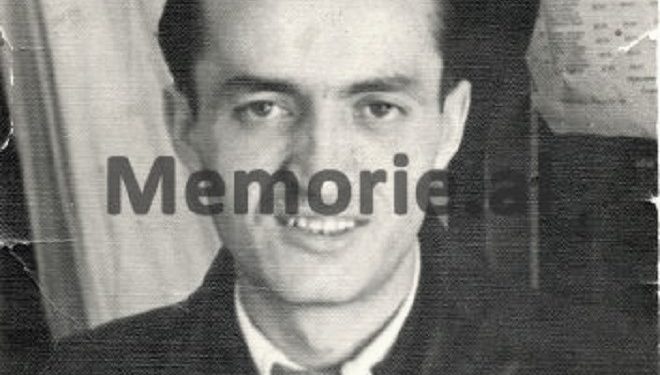
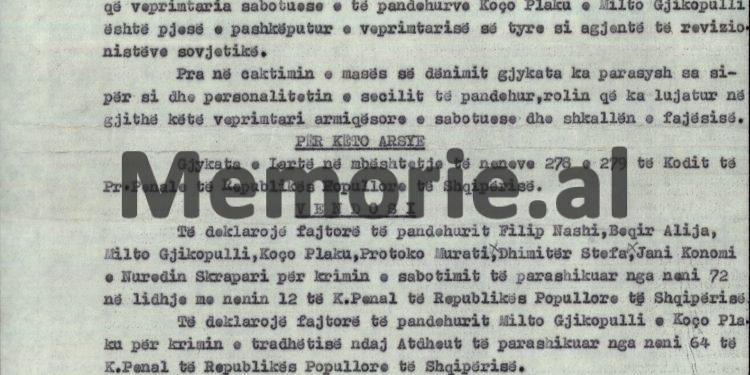
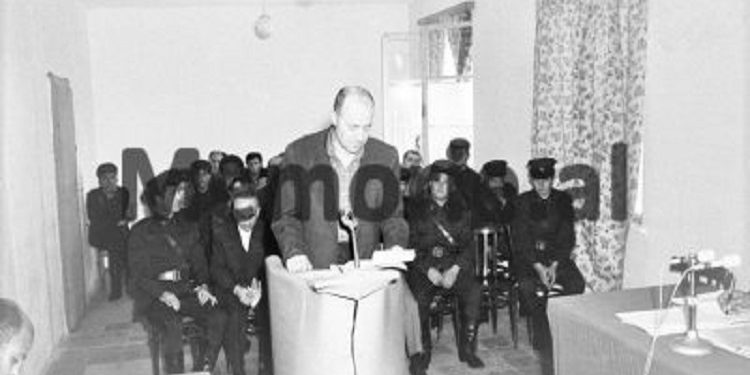
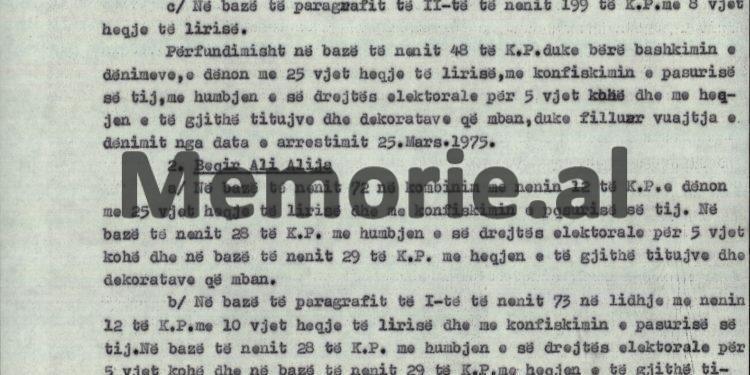
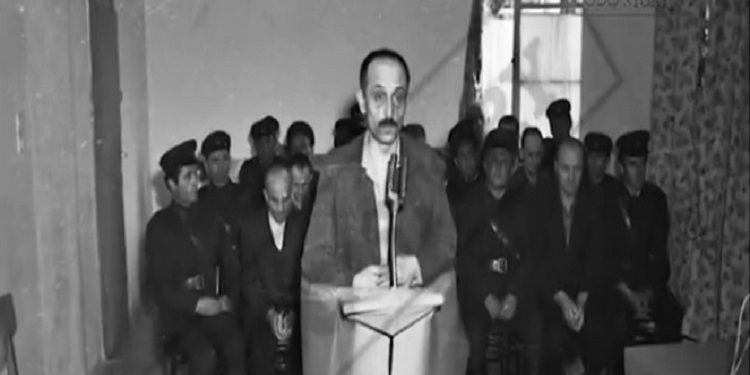
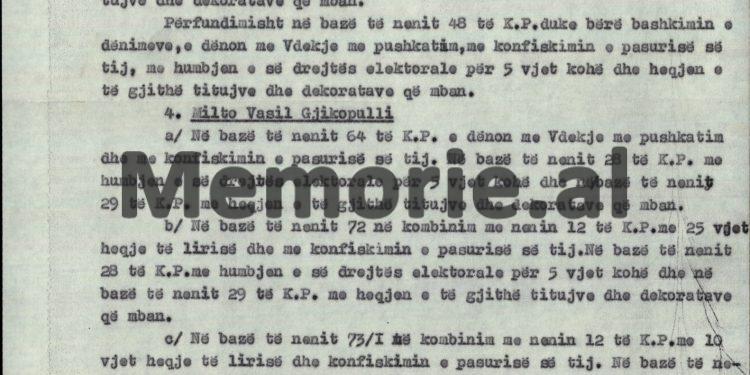
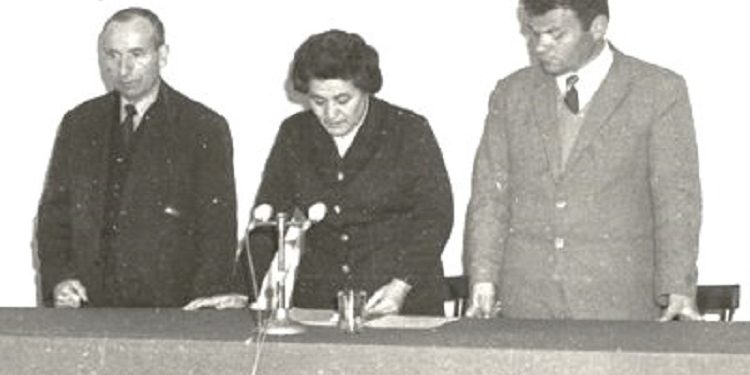
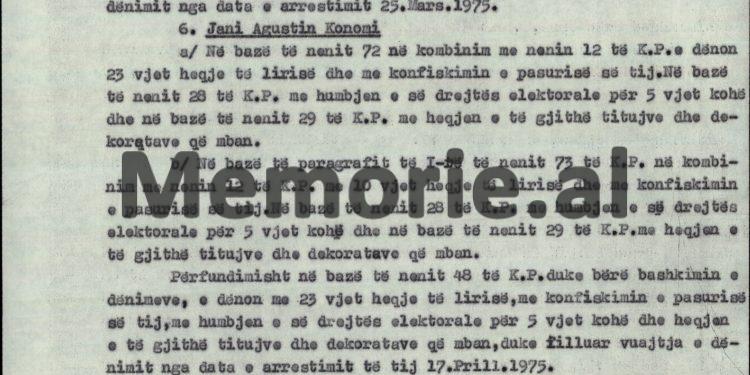
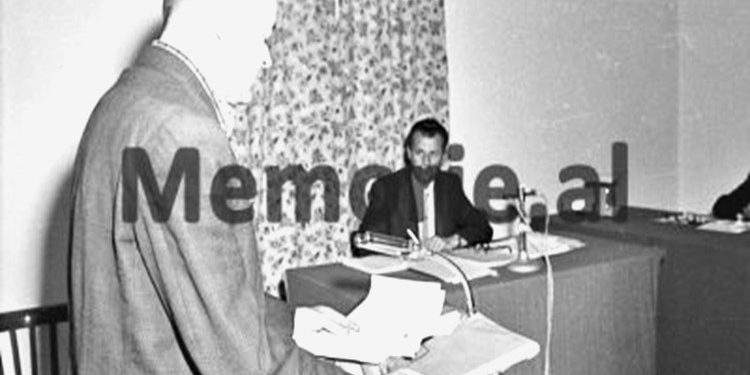
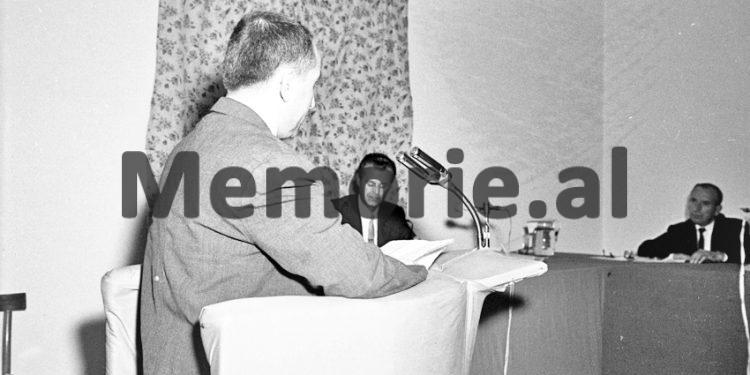
![“The ensemble, led by saxophonist M. Murthi, violinist M. Tare, [with] S. Reka on accordion and piano, [and] saxophonist S. Selmani, were…”/ The unknown history of the “Dajti” orchestra during the communist regime.](https://memorie.al/wp-content/uploads/2026/02/admin-ajax-3-350x250.jpg)
![“In an attempt to rescue one another, 10 workers were poisoned, but besides the brigadier, [another] 6 also died…”/ The secret document of June 11, 1979, is revealed, regarding the deaths of 6 employees at the Metallurgy Plant.](https://memorie.al/wp-content/uploads/2026/02/maxresdefault-350x250.jpg)




